Taking Charge of Your Health
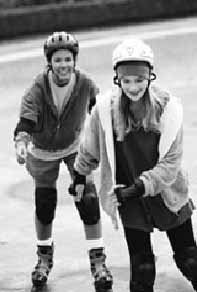
As a teenager, you are going through a lot of changes. Your body is changing and growing. Have you noticed that every year, you can't seem to fit into your old shoes anymore? Or that your favorite jeans are now tighter or 3 inches too short? Your body is on its way to becoming its adult size.
Along with your physical changes, you are also becoming more independent. You are starting to make more choices about your life. You are relying less on your parents and more on yourself and your friends when making decisions. Some of the biggest choices that you face are those about your health.
Why should you care about your health? Well, there are lots of reasons—like feeling good, looking good, and getting stronger. Doing well in school, work, or other activities (like sports) is another reason. Believe it or not, these can all be affected by your health!
Healthy eating and being active now may also help prevent diabetes, high blood pressure, heart disease, osteoporosis, stroke, and some forms of cancer when you are older.
Some teenagers are not very physically active and some do not get the foods that their growing bodies need.
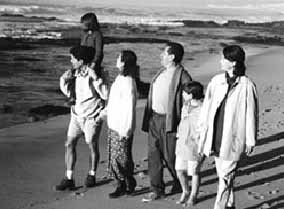
Now is the time to take charge of your health by eating better and being more physically active. Even small changes will help you look and feel your best!
Family Matters
To learn more about your health, start by looking at your family.
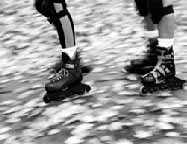
Are your parents, brothers, or sisters overweight? Do any of them have health problems related to their weight, such as type 2 diabetes? Your family's gene pool, eating habits, and activities can all play a role in your health and the way you look.
Type 2 diabetes is increasing in adolescents and teenagers who are overweight. Diabetes means that blood glucose (blood sugar) is too high. Diabetes is serious. It can hurt your eyes, kidneys, heart and blood vessels, gums, and teeth.
Even if members of your family have type 2 diabetes or other health problems, it doesn't mean that you will have the same problems. To lower your chances of developing them, eat healthy foods, get moving, and talk to your family or health care provider if you are concerned about your weight or health.
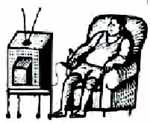
So, where do I start?
The road to better health starts with good eating and physical activity habits. Being aware of your habits will help you learn where you need to make changes.
Do you normally watch a lot of TV or play a lot of video games? These activities can be relaxing, but you don't need to move much to do them. Spending too much time not moving around can make you feel tired and lazy, and lead to poor muscle tone. You can be active every day and still have time to do other things you enjoy, like playing video games!
Physical Activity—It Doesn't Have To Be A Chore!
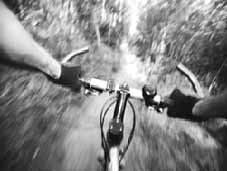
Being active means moving more every day. You can choose activities that are fun and do them on your own or with your friends.
Being more active will make you feel better and give you more energy. It can also help you think and concentrate better, which will help you in school or at work. Activity can help you feel less bored and depressed, and help you handle stress.
So don't wait—start today. Begin slowly and make small changes in your daily routine, like
| spending less time in front of the TV | |
| taking the stairs instead of the elevator | |
| walking to school instead of taking the bus (or if you drive, parking further away on the school parking lot). |
What you choose to do is up to you. Just pick something that you like to do and keep it up. Have fun while being active each day to stay healthy and fit. Remember, you don't have to give up the video games—just make sure that you also fit activity into your day.
Get Moving!
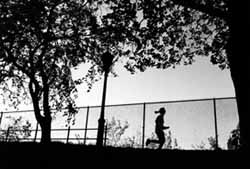
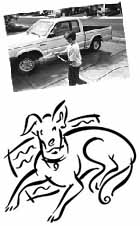
| Walk—to school, to work, to your friend's house, to the mall. | |
| Ride your bike. | |
| Skateboard. | |
| Rollerblade | |
| Walk with a friend or family member—make it "quality time"! | |
| Play basketball. | |
| Join a school sports team or club. | |
| Walk the family dog. If you don't have one, find a neighbor who does. | |
| Go dancing. | |
| Go for a hike. | |
| Go for a swim. | |
| Wash the car. | |
| Clean the house. | |
| Mow the lawn. |
You Are What You Eat!
Take a look at your eating habits. What you eat, where you eat, and why you eat are important to your health. As a teen, you need to eat a variety of foods that give you the nutrients your growing body needs. Eating better and being more active can make you feel better and think more clearly.
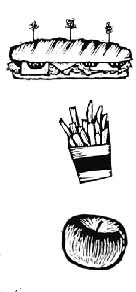
What do you eat?
If you eat a lot of burgers and fries or pizza loaded with toppings—plus an extra helping of dessert—your diet is probably not balanced.
There's nothing wrong with eating these foods—you just need to eat smaller amounts and balance them with other foods.
Where do you usually eat?
If you eat in places such as your room or in front of the TV, you may want to change that habit. Eating while doing other things makes it easy to lose track of how much you've already eaten.
By eating meals and snacks at a table, you can pay more attention to what you're eating so that you don't overeat.
(If you want to snack while watching TV, take a small amount of food with you—such as a handful of pretzels or a couple of cookies—not the whole bag.)
Why do you eat?
To see if you need to change your eating habits, let's look at why you eat. For most people, reasons to eat are:
| Time of day | |
| Hunger | |
| Food looks tempting | |
| Everyone else is eating | |
| Boredom, frustration, nervousness, or sadness |
The best reason to eat is because your body tells you that you are hungry. If you are eating when you are not hungry, try doing something else to get food off of your mind. Call a friend, exercise, read, or work on a craft. These activities can help you to cut back on eating when you are feeling bored, upset, or stressed.
To improve your eating habits, try to eat the suggested number of servings from each food group in the Food Guide Pyramid.
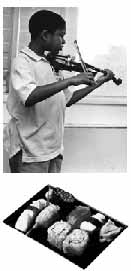
Snack Attack
| Baked potato chips or tortilla chips with salsa | |
| Pretzels (lightly salted or unsalted) | |
| Bagels with tomato sauce and low fat cheese | |
| Flavored rice cakes (like caramel or apple cinnamon) | |
| Popcorn—air popped or low fat microwave | |
| Veggies with low fat or fat-free dip | |
| Low fat cottage cheese topped with fruit or spread on whole-wheat crackers | |
| Ice milk, low fat frozen or regular yogurt (add skim milk, orange or pineapple juice, and sliced bananas or strawberries to make a low fat milk shake) | |
| Frozen fruit bars | |
| Vanilla wafers, gingersnaps, graham crackers, animal crackers, fig bars, raisins | |
| Angel food cake topped with strawberries or raspberries and low fat whipped cream | |
| String cheese |
Staying Healthy and Happy
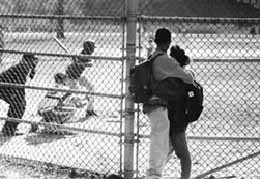
Being a teenager can be tough, and sometimes teens who are healthy try to lose weight even though they don't need to. You may feel a lot of pressure to look a certain way. Acting on this pressure may lead to eating disorders like anorexia nervosa or bulimia nervosa.
Anorexia nervosa is a form of self-starvation where a person does not eat enough food to keep healthy and does not maintain a healthy weight.
Bulimia nervosa is when a person eats a lot of food and then vomits or uses other methods, such as fasting or over exercising, to avoid gaining weight after overeating.
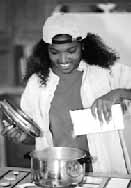
If you would like to learn more about eating disorders, see the list of resources at the end of this chapter.
If you are concerned about your eating habits or the way you look, it's important to talk to someone you trust. Try talking to a parent, friend, doctor, teacher, or counselor at your school.
Being happy with who you are and what you look like is important for a healthy body and mind. You don't have to be an athlete, supermodel, or movie star to like who you are and to stay fit and healthy.
You can take charge of your health by making small changes in your eating and physical activity habits. These changes will help you feel and look better now and be healthier for the rest of your life!
Additional Reading
| 10 Tips to Healthy Eating and Physical Activity For You (Brochure), 1998. International Food Information Council Foundation 1100 Connecticut Ave., NW Suite 430 Washington, DC 20036 (202) 296-6540 www.ific.org/publications/brochures/tentipskidsbroch.cfm | |
| Binge Eating Disorder National Institute of Diabetes and Digestive and Kidney Diseases (NIDDK/WIN) NIH publication no. 99-3589, May 2000. Available from WIN. | |
| Everything You Need to Know About Eating Disorders: Anorexia and Bulimia R. Kubersky, The Rosen Publishing Group, Inc.: New York, NY. 1999. Healthy Teens: Facing the Challenges of Young Lives | |
| A. McCarthy, Bridge Communications, Inc.: Birmingham, MI. 2000. | |
| Overweight Teenagers: Don't Bear the Burden Alone M. Lebow, Perseus Publishing: Cambridge, MA. 1995. | |
| The Teenage Body Book K. McCoy and C. Wibbelsman, Penguin Putnam Inc.: New York, NY. 1999. | |
| "Teen-Directed Weight Management" by K. French and E. Strenkowski, in The Weight Control Digest. pp. 499-500, Jan./Feb. 1996. |
Resources and Organizations
The American Dietetic Association
216 West Jackson Blvd.
Chicago, IL 60606-6995
1-800-366-1655
www.eatright.org
International Food Information Council Foundation
1100 Connecticut Ave. NW, Suite 430
Washington, DC 20036
(202) 296-6540
www.ific.org
National Diabetes Education Program
1 Diabetes Way
Bethesda, MD 20892-3560
1-800-860-8747
http://ndep.nih.gov
National Diabetes Information Clearinghouse
1 Information Way
Bethesda, MD 20892-3560
1-800-860-8747 or
(301) 654-3327
www.niddk.nih.gov/health/diabetes/ndic.htm
National Eating Disorders Association
603 Stewart St.
Suite 803
Seattle, WA 98101
1-800-931-2237
www.nationaleatingdisorders.org
Overeaters Anonymous Headquarters
World Services Office
P.O. Box 44020
Rio Rancho, NM 87174-4020
(505) 891-2664
http://overeatersanonymous.org
President's Council on Physical
Fitness and Sports
200 Independence Ave. SW, Room 738H
Washington, DC 20201-0004
(202) 690-9000
www.fitness.gov